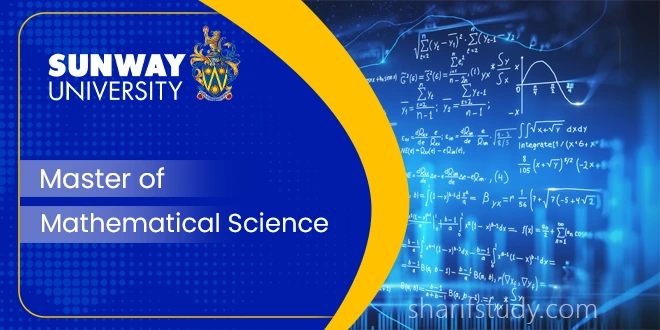The Master of Science in Mathematical Sciences is a research program that provides students with a competitive advantage in research by providing deep training facilitated by specialists. Sunway Master of Mathematical Science candidates will be incorporated as members of their research groups at Sunway University as postgraduate students, with numerous possibilities to participate in research alongside supervisors through lectures, workshops, laboratory and field work.
Program Review
The curriculum will concentrate on fields of study such as evolutionary computation, big data analytics, computational fluid dynamics, statistical process control, and others.
This program will encourage the following graduate traits that fit with and support the university’s mission:
- highly employable graduates who are knowledgeable and technically competent in various fields of mathematics and statistics.
- graduates with the mathematical and analytical skills with competencies in critical thinking and problem solving.
- graduates with managerial and entrepreneurial skills to be able to communicate effectively.
- graduates who are ethical and responsible with expertise in mathematical and statistical knowledge.
- graduates who recognize the need to engage in life-long learning for personal and professional growth and development.
Graduates of this program will be prepared with a diverse set of abilities applicable to a variety of sectors. This enables graduates to look for senior roles in industries such as finance, education, consulting, administration, information technology, and business, among others.
| Intakes |
Duration
|
| Rolling Intake | 3 Years (full-time) 4 Years (part-time) |
Benefits of Study Mathematical Science at Sunway
Global Skills: This program teaches you skills that are valued worldwide. You learn advanced mathematics and statistics, which are essential in various global industries. These skills open doors to international careers in finance, IT, business, and more.
Real-World Application: The program shows you how to apply mathematical theories to solve actual problems. This is especially useful in fields like technology, engineering, and finance. You will learn to tackle real challenges you might face in these industries.
Innovative Learning: The course focuses on innovative thinking. This means you will not just learn mathematical concepts; you will also learn how to think creatively to find new solutions to complex problems. This approach is highly valued in today’s job market.
Program Structure
The curriculum is made up of core courses that are followed by a research thesis.
Courses
In addition to the Thesis component, candidates must complete two modules: Research Methodology and Directed Readings. Candidates who complete these modules will get the essential skills and knowledge to successfully conduct research toward the completion of their thesis.
Thesis
The Master of Science in Mathematical Sciences degree is conferred upon satisfactory completion of a thesis. The thesis should demonstrate expertise, critical thinking, and knowledge of the subject or field of research selected.
Areas of Research
The School offers a specialized staff of academicians who will mentor you and discuss potential research subjects with you in the following study fields, but not limited to:
- Applied econometric
- Evolutionary computation
- Optimal control and numerical optimization
- Time series analysis and forecasting
- Big data analytics
- Graph theory and combinatorics
- Statistical modelling
- Computational fluid dynamics
- Neural networks
- Statistical process control
Applied Econometrics
Applied Econometrics is a branch of economics that applies statistical methods to economic data to give empirical content to economic relationships.
Essentially, it’s about using real-world data to test economic theories or to forecast future economic trends. Applied econometricians collect and analyze data, using various techniques to assess economic models. They might study anything from how consumer behavior impacts the economy to the effects of policy changes.
Evolutionary Computation
Evolutionary Computation is a fascinating area of computer science that draws inspiration from biological evolution to solve complex computational problems. It involves algorithms that mimic the process of natural selection, where the fittest solutions are selected for recombination and mutation to produce new generations of solutions.
This approach is particularly effective for optimization problems where traditional methods may fall short.
Optimal Control and Numerical Optimization
Optimal Control and Numerical Optimization is an advanced field of study that combines mathematical theory, computer science, and engineering. It focuses on finding the best possible solution (or control) in a system that changes over time, under certain constraints and conditions.
This could involve, for instance, minimizing the cost, maximizing efficiency, or achieving the best performance in various engineering and economic systems.
Time Series Analysis and Forecasting
Time Series Analysis and Forecasting is a crucial statistical tool used in various fields like economics, finance, environmental science, and engineering. It involves analyzing data points collected or recorded at regular time intervals to understand underlying patterns, trends, and cycles. This analysis helps in making informed predictions or forecasts about future events based on historical data.
Big Data Analytics
Big Data Analytics is a rapidly growing field that deals with the extraction of insights from large and complex data sets, often too vast for traditional data processing software to handle. It combines advanced analytics techniques, including statistical algorithms and artificial intelligence, to process and analyze various forms of data from multiple sources.
This analysis helps in uncovering hidden patterns, unknown correlations, market trends, customer preferences, and other useful business information.
Graph Theory and Combinatorics
Graph Theory and Combinatorics are fundamental areas of mathematics with wide-ranging applications in computer science, engineering, and optimization. It is the study of graphs, which are mathematical structures used to model pairwise relations between objects.
Statistical Modelling
Statistical Modelling is a methodical approach in analyzing and interpreting data to uncover relationships between variables and predict future trends or outcomes. It involves constructing mathematical models that represent the data generating process, allowing for the understanding and quantification of uncertainty and variability within the data.
You can use Statistical models in fields such as finance, marketing, environmental science, and public health.
Computational Fluid Dynamics
Computational Fluid Dynamics(CFD) is a branch of fluid mechanics that uses numerical analysis and algorithms to solve and analyze problems involving fluid flows.
Engineers use computers to perform calculations that simulate the interaction of liquids and gases with surfaces under specific boundary conditions. In engineering disciplines like aerospace, automotive, and environmental engineering, professionals extensively employ Computational Fluid Dynamics (CFD) to design and analyze systems where fluid behavior is critical.
Neural Networks
Neural Networks are a foundational concept in artificial intelligence and machine learning, inspired by the structure and function of the human brain. They are composed of layers of interconnected nodes or ‘neurons’, which process and transmit information. Each connection between neurons can transmit a signal from one neuron to another.
The receiving neuron processes the signal and then signals downstream neurons connected to it. Neural networks use a collection of data, allowing them to learn to recognize patterns and make decisions.
Statistical Process Control
Statistical Process Control (SPC) is a methodological approach for quality control and management. It employs statistical tools to monitor and control a process, ensuring that it operates at its full potential to produce conforming product. Fundamentally, SPC is about measuring and controlling quality during the manufacturing process.
Entry Requirements
General Requirements
Candidates should have one of the following qualifications:
- A Bachelor’s Degree in mathematical sciences or related fields with a minimum CGPA of 2.75 or equivalent; or
- A Bachelor’s Degree in the mathematical sciences or related fields with a minimum CGPA of 2.50 and not meeting CGPA of 2.75 is acceptable subject to rigorous internal assessment; or
- Other Qualifications – Any other qualifications will be considered on a case-to-case basis and subject to the approval and acceptance by University Senate.
English Requirements
International candidates must have English ability sufficient to satisfy the program’s requirements:
- IELTS 6.0 or equivalent
Note: Candidates who have completed a Bachelor’s degree or equivalent in English would have met the language requirement.
Career Options
Graduates of the Master of Mathematical Science from Sunway University have diverse career prospects. They can excel in academia and research, developing new mathematical insights. Opportunities in IT services utilize their skills in algorithm development and problem-solving.
In financial and investment management, they apply quantitative methods for risk assessment and investment strategies. Consultancy and education sectors also benefit from their analytical prowess, addressing business challenges and shaping future mathematicians, respectively.
- Professional activities in academic institutions and research Institutes
- IT services
- Financial services
- Investment management
- Consultancy firm
- Education
Program Fees
Sunway Master of Mathematical Science fees are different for Malaysian and International students. Malaysian students enjoy lower annual fees, reflecting local affordability.
International students have different rates, considering extra resources provided. following table shows annual fees for the program.
| Malaysian Students | International Students |
| RM45,700 | USD10,796 |
International students must pay their fees in RM equivalent. The USD here is just an indicative/estimation and subject to the prevalent exchange rate.
 SharifStudy Best way to Study in Malaysia
SharifStudy Best way to Study in Malaysia




